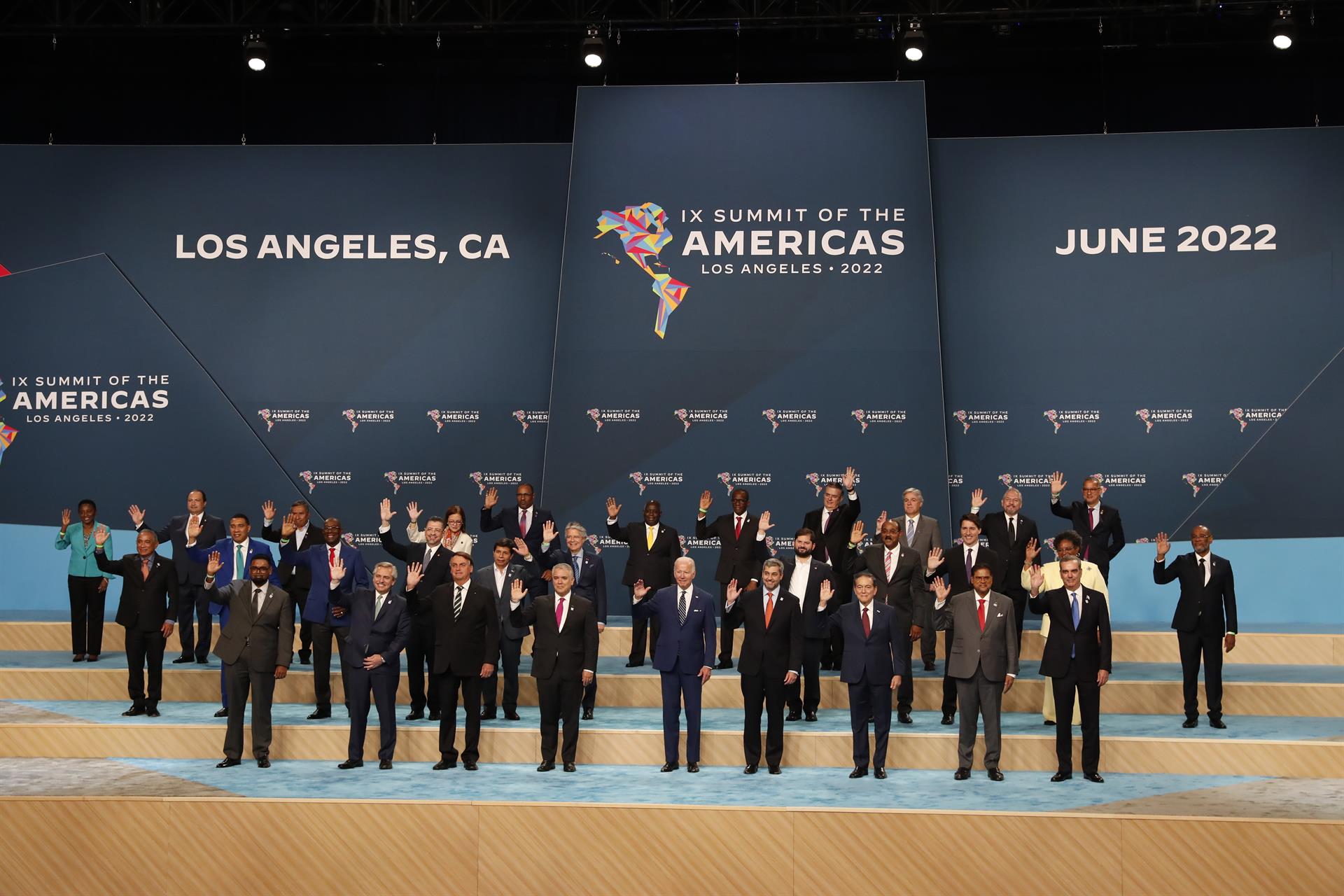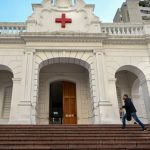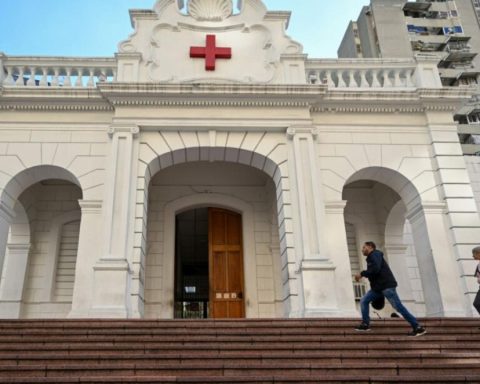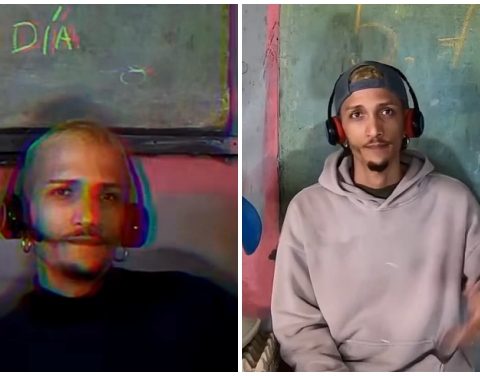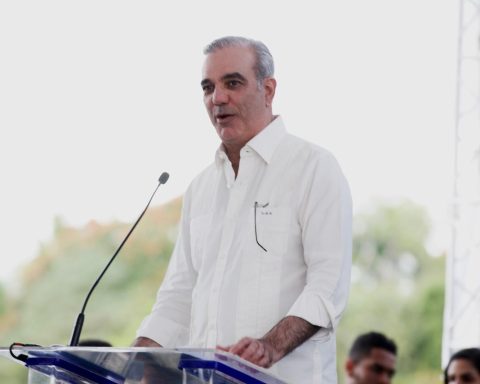The IX Summit of the Americas concluded this Friday, June 10, with the so-called “Declaration on Migration and Protection of Los Angeles”, focused on the “will to strengthen national, regional and hemispheric efforts in order to create the conditions for safe migration , orderly, human and regular”, which was signed in the midst of political tensions derived from the severe ideological cracks that prevail in the region.
The most important presidential meeting in the hemisphere faced severe complications even before it began, when the United States vetoed the regimes of Nicaragua, Cuba, and Venezuela for their human rights violations and violations of civil liberties.
Although Daniel Ortega’s regime was not invited to the event, Nicaragua was present through different expressions of civil society in exile, who took advantage of the forum to denounce the sociopolitical crisis that grips the country due to the de facto police state imposed by Ortega and raised the demand for freedom for the more than 180 political prisoners who remain in the jails of the dictatorship.
The US defends agreements at the Summit
Emily Mendrala, Deputy Assistant Secretary of State for the US Bureau of Western Hemisphere Affairs, in an interview with the program This weekwhich is broadcast this Sunday through YouTube, Facebook Live and Twitter, defended the scope of the agreements reached at the Summit, despite the fact that they ignored the crisis of democracies in the region.
“The United States is very focused on the structural causes of migration throughout the region. In the case of northern Central America, we have focused for several years on insecurity and lack of governance, on the creation of economic opportunities to minimize the structural causes of the migration matrix in these countries,” Mendrala responded.
In an effort to create favorable economic scenarios that help curb the migratory flow, the United States promised to develop initiatives for 2,000 million dollars to encourage private investment in Central America, focused mainly on the Northern Triangle (Guatemala, El Salvador and Honduras), and Nicaragua was left out of these projects.
Mendrala: crisis was addressed
The Joe Biden official acknowledged that there is concern on the part of the United States Government about what happens in nations that expel migrants due to their policies of political repression and their authoritarian actions, as are the cases of Nicaragua, Cuba and Venezuela.
“We accompany the declaration today announcing an increase in resources for protection in the region, administered by the Department of State. We also announced an increase in resources to the World Bank, to manage a fund that is precisely focused on helping communities that receive large numbers of migrants and refugees,” Mendrala stressed.
“We believe that the principles that are contained in the migration and protection declaration offer a response to irregular migration in the region, which also depends on the commitments made by each country in the region to implement them,” he added.
Mendrala insisted that in addition to the primary aspect referring to the steps to stop the migratory flow, the Summit was “very fruitful” in addressing other key issues such as the strengthening of democracies, climate change and post-pandemic economic recovery.
“We invite the countries of the region to come and debate (on democracy). These are very important conversations that we should have at the regional level with all the countries in the region and we are always condemning the situation of the (political) prisoners in Nicaragua, for example, and also in Cuba. These are things that concern us a lot; the lack of freedom of expression, the lack of freedom of demonstration and that we should talk about these issues at the Summit”, he replied.
President Boric’s call
During the plenary session of the government representatives, the president of Chile, Gabriel Boric, questioned the exclusion of the United States by not inviting the countries he considers undemocratic, but he also advocated for the political prisoners kidnapped by these regimes.
“Why don’t I like the exclusion of Cuba, Venezuela and Nicaragua? Do you know why? Because it would be different to argue in a forum like this, with all the countries present, including those that decided to withdraw due to this exclusion, the urgent need for the release of the political prisoners of Nicaragua or also, the moral and practical importance of finishing once and for all for all with the unjust and unacceptable blockade of the United States against the people of Cuba”, stated President Boric in his speech.
The details of the Los Angeles declaration
Precisely, these tensions due to the problems with the democratic systems were reflected in the final declaration signed by the government representatives present at the event, since the document focuses on promising solutions to the severe migration crisis, and does not delve into other issues. as the growth of political authoritarianism in the continent.
“We recognize the need to promote political, economic, security, social and environmental conditions for people to lead peaceful, productive and dignified lives in their countries of origin. Migration should be a voluntary and informed choice, and not a necessity”, states the “Los Angeles Declaration on Migration and Protection”.
“We are committed to protecting the safety and dignity of all migrants, refugees, asylum seekers and stateless persons, regardless of their migratory status, and to respecting their human rights and fundamental freedoms,” it adds.
“We anticipate cooperating closely to facilitate safe, orderly, humane and regular migration and, as appropriate, promote safe and dignified returns, consistent with national law, the principle of non-refoulement and our respective obligations under international law” , Add.
The declaration also states that irregular international migration must be addressed with a regional approach, and that the current health, social and economic challenges related to the covid-19 pandemic exacerbate the fundamental causes that drive irregular migration, due to the vulnerabilities of migrants and their communities.
“We intend to expand efforts to address the root causes of irregular migration throughout our hemisphere, in order to improve conditions and opportunities in countries of origin and promote respect for human rights. We reaffirm the importance of the safe, dignified and sustainable return, readmission and reintegration of migrants to help them re-establish themselves in their communities of origin”, cites the final declaration.
The keys of the Summit to regulate migration
Thus, common objectives were defined to achieve conditions for safe, orderly, humane and regular migration through a solid distribution of responsibilities:
- Convene multilateral development banks, international financial institutions, and traditional and non-traditional donors to examine financial support instruments for countries hosting migrant populations and facing other migration challenges, without prejudice to priorities and existing funding programs.
- Enhance regional cooperation mechanisms for law enforcement cooperation, information sharing, protection-sensitive border management, visa regimes and standardization processes, as appropriate and in accordance with legislation national.
- Strengthen and expand temporary labor migration pathways, as feasible, that benefit countries in the region, including through new programs that promote connections between employers and migrant workers, strong safeguards for ethical hiring, and legal protection of rights from the workers.
- Improve access for all migrants, refugees and stateless persons to public and private services to promote their full social and economic inclusion in host communities.
- Expand access to regular pathways for migrants and refugees to include family reunification options, where appropriate and feasible, in accordance with national law.
